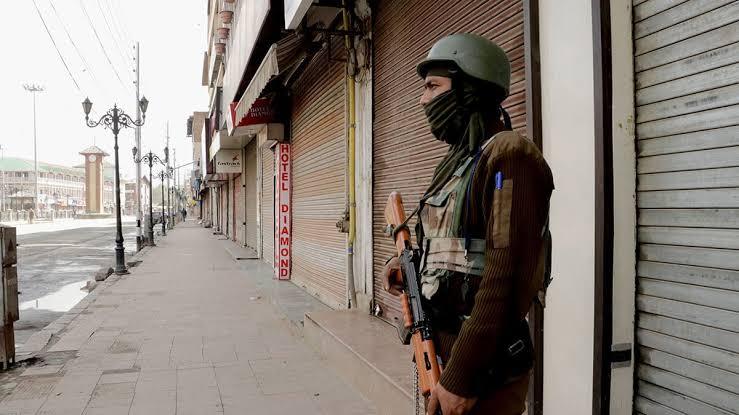In Kashmir, Strength Lies In Changing Course

As Kashmir crosses the 60th day of communications shutdown, a lot of rhetoric and rationalisations are floating around about the situation and Kashmiris. From India’s Union Home Minister speaking of “restrictions” as being “only in your mind”, to the Indian Army Chief saying that “...normal life in Jammu and Kashmir has not been affected” and the Governor claiming that Kashmiris need “special treatment” and not “special status”; these are just a few examples of the ‘plain-speaking’ we have all been subjected to.
If restrictions are, for instance, just “in our mind” then why is the news blackout of all news except for government propaganda and news from far? Why is it that barring restoring 23,000 landlines, eight million mobiles are shut, there is a complete internet lock-down and restrictions on movement? Are all these also merely a figment of one’s imagination? Why is the argument advanced by unnamed officials insistent that the communication shutdown has been imposed to save Kashmiris from getting “indoctrinated”? Implying that it is part of government policy to restrict people from interacting, networking or contradicting the official version.
As for normal life, if it has “not been affected” then why deploy 9.5 lakh troops, bring back bunkers again after 10 years, place barriers and checkpoints on roads and highways, and concertina wires in and around residential colonies, which are making entry and exit precarious? Is this a mark of “normalcy” or captivity? As for “special treatment”, I guess the governor was bang on target. That is precisely what is being inflicted on our fellow citizens in Kashmir.
Nevertheless, it also reveals a desperate attempt to present a brave face by reducing things to the lowest common denominator, which even surpasses India’s own standard of brazen display of power bereft of any concern for the people of Jammu and Kashmir (J&K). The potentates above are not the only participants in this white-washing of a grim reality.
Justice Ali Mohammed Magray, in a recent report submitted to the Supreme Court regarding detentions of juveniles in J&K, presented the official version which claims that as many as 144 juveniles, as young as nine years old, were detained between 5 August and 23 September. The Police claimed that they were “strictly dealt with in accordance with the Juvenile Justice Act”. Forty six of these 144 were detained in “observation homes” and 25 children were bailed out. Of the 46 detained, 36 were in Srinagar and 10 in Jammu. There are, as of now, 21 still detained in “observation homes” pending inquiry; 15 in Srinagar and six in Jammu. They were picked up for alleged stone-pelting. It is only in dictatorships that children get targeted. Where the rule of law becomes rule by law.
Rules and regulations are arbitrarily changed in the name of “national security”. When no consultations took place prior to abrogation of Articles 370 and 35A, leaders from those espousing ‘Azaadi’ as well those who preached ‘integration’ detained, other activists jailed outside Kashmir, can leaderless Kashmiris be blamed for picking up stones to vent their fury at being treated as the “enemy” and kept in virtual captivity?
The rapid rate of decline in all avenues of redress and the rise in people’s doubts over the judiciary’s capacity to protect their “life and liberty” and provide redress, can be seen from genuflections over easy access to courts of Justice. Neither the District Courts nor the High Court function fully. There are just nine High Court judges in J&K, where the number of just Habeas Corpus petitions registered after 5 August are in excess of 250. Whereas, the numbers of those detained in J&K and outside alone are in thousands. Its well nigh impossible to accept that restrictions have not impaired access to judiciary.
But the Supreme Court said that “we have received a report from the chief justice (of Jammu and Kashmir High Court) which does not support your statement.” A bench headed by Chief Justice Ranjan Gogoi said this to senior advocate Huzefa Ahmadi, who had on 16 September told the top court that people in the Valley were finding it difficult to approach the high court there.
This, when the High Court’s own website had claimed that “restrictions were hampering movement”, postal services remain suspended, and so ‘dasti’ notices have to be served in person, communication blockade prevails on sending or receiving messages or information, and scores of lawyers have been detained and petitioners are finding it hard to move around, lawyers also find.
And to crown it all, the long delay by the apex court to hear Habeas Corpus petitions as well challenges to abrogation of Articles 370 and 35A. By the time 14 November comes, much water would have flowed and there is fear that a fait accompli would be served. So what chance is there for the Court’s order to be carried out, were it to rule against the abrogation? These questions rear their head and shake people’s faith in the judiciary.
Take another area of concern. An elementary but essential task of registering births and obtaining death certificates has been impaired in Kashmir. In this day and age, when threat of throwing out infiltrators resounds from the highest quarters, and the spectre of NRC hangs over India, not having a birth certificate is going to be held against a newly-born child. And as for death certificates, without one, a widow can not avail of pension. The government’s refusal to allow BSNL to provide internet access to the designated authority for recording births and deaths, even on “humanitarian grounds”, is another cause of concern.
Look also at the farce of releasing leaders in Jammu to create the impression of a “level playing field” for Block Development Council (BDC) “elections”. Seven leaders from the National Conference, the Congress and the J&K Panthers Party were told to “desist from issuing any public statement” and keep away from mentioning anything critical on Article 370’s revocation.
The polls, in any case, are fraudulent in Kashmir, where out of a total of 19,578 posts of panchas and sarpanches, only 7,029 were filled (that too in a miserable voter turnout which brought in uncontested ‘victors’) and 12,549 remain vacant. In other words, nearly sixty-five per cent of seats officially remain vacant and yet its 35% panchas will “elect” BDC members. This is supposed to bring “grass root level democracy” and usher in “development”. The brazenness of this exercise speaks for itself.
Above all, what is conspicuously missing in government pronouncements is the issue of people’s fear of losing their land and jobs to outsiders in J&K. The refusal of the government to heed the suggestion of the head of the Rashtriya Swayamsevak Sangh (RSS) makes this refusal to put at rest fears over losing land and jobs to outsiders even more pregnant with meaning.
The RSS chief, Mohan Bhagwat, when asked about apprehensions that the government’s decision to do away with Article 370 will lead to “outsiders” buying land in Kashmir, reportedly said, “Whatever fears they have about losing land and jobs should be allayed.”
It is a cryptic remark, in response to a question posed by foreign correspondents, directed at the international public, and “settling nationalists” in Kashmir has been a long-standing demand of the cadres, therefore, to be taken with a pinch of salt. However, it is equally true that the issue of land and job-protection cuts across region and religion in the erstwhile state of Jammu and Kashmir. Even BJP and RSS members in Jammu have spoken out against this. And as head of the RSS Bhagwat could not have been unaware of this sense of insecurity among his own rank and file in Jammu. Yet, the Indian government and its officials keep their lips sealed.
Now, if even a suggestion by RSS’s own head for the government, to “allay fears” of the people of J&K remains unheeded, it only means that the government remains indifferent to any counsel, and has stuck to strong-arming its way into carrying out its plans and policies. But as they say, at times, even best-laid plans fall by the wayside.
While the government gives the impression that they are in “full control” and “ready to face any challenge”, the fact is that passive resistance has to a great extent punctured the myth of the omnipotent authority of the government. By abrogating Article 370, there is no talking point left for the government to retreat to. Whereas movement forward is stymied by the very restrictions the government uses to coerce Kashmiris to give in and give up. It is for this reason that assertions and claims of the government remain unconvincing.
Despite the lack of communication and any possibility of networking, shared suffering has driven Kashmiris to the only logical course left open to them; to offer passive resistance to make themselves visible when there is an attempt to silence them. In a David versus Goliath moment, the people’s schedules for opening and shutting markets, children boycotting schools, people refusing to take risks by venturing out, and at some places strong local opposition to those violating this schedule, have all ensured that civil disobedience holds and the government’s designs are foiled.
All the above reasons, most of them of government’s own making, have ensured that conflict and clashes lie ahead. While the death toll is low for now, what will happen once restrictions are lifted is anyone’s guess. Lt General DS Hooda, who headed the Indian Army’s Northern Command during the “surgical strike”, has reminded the government that their real test is how they address the situation once restrictions are lifted and people come out in protest.
What if restrictions carry on beyond two months? Will not every day which passes erode the support the government has enjoyed thus far in India since 5 August?
Sagacity, therefore, lies in changing course while it is still possible to stem a descent into the abyss and before it turns virulent, something which the international community will scarcely be able to ignore. Unfortunately for India, developments in Afghanistan with near-certainty of resumption of dialogue between the United States (US) and Taliban are sending signals that the times ahead will conscript India’s manoeuvrability.
Because, barring India, everyone else including China and Russia are on board for a US-Taliban agreement as the first step to Taliban-Kabul regime negotiation. Rightly so, because it was the US led NATO allies that overthrew the Taliban regime from Kabul. Therefore, its only possible to have Taliban on board for talks with Kabul regime, if the US can strike an agreement with Taliban and announces a schedule for pulling out US troops.
A flare-up in Kashmir is the last thing that anyone wants, given that Pakistan is critical to the successful completion of the Afghan peace process. They are certain to use the situation in Kashmir to sound the alarm and demand US intervention. Consequently, any development which jeopardises this political settlement process in Afghanistan risks inviting international and, in particular, regional wrath and earn India opprobrium for its handling of Kashmir dispute.
The volatile nature of India’s neighbourhood, where it shares border disputes with two of its neighbours and with the war in Afghanistan still raging, is not propitious, in any case, to carry on with strong-arm policies in Kashmir.
Indians can live under the delusion that India is now a global player rubbing shoulders with the mightiest of all, Donald Trump, and what it does to its own people inside its borders is of no one’s concern. But the US President can switch gears at any time. The person whose face glares at us from billboards can come to hurt India’s best-laid plans. India’s clout then would show itself to remain home-bound. Besides, in a climate of economic crisis, where dependence on foreign sources of funds and finance become critical, international influences can get magnified and ought not to be discounted.
Given this, one wonders if it is not wiser for the government of India to change course in the direction of actually undoing the mistakes of earlier governments, by opting for a democratic political process. Instead of out-performing the Congress party in stooping low, it might be better if the energies are directed to opt for a democratic resolution. Real strength lies in acknowledging mistakes, not just of one’s predecessors but of the current government too, and moving to change course. Lest the myths which are spun end up hurting us and haunt us all for a long time to come. Surely that cannot be the intention behind the policy shift on Kashmir? Is it?
The Views are personal.
Get the latest reports & analysis with people's perspective on Protests, movements & deep analytical videos, discussions of the current affairs in your Telegram app. Subscribe to NewsClick's Telegram channel & get Real-Time updates on stories, as they get published on our website.























